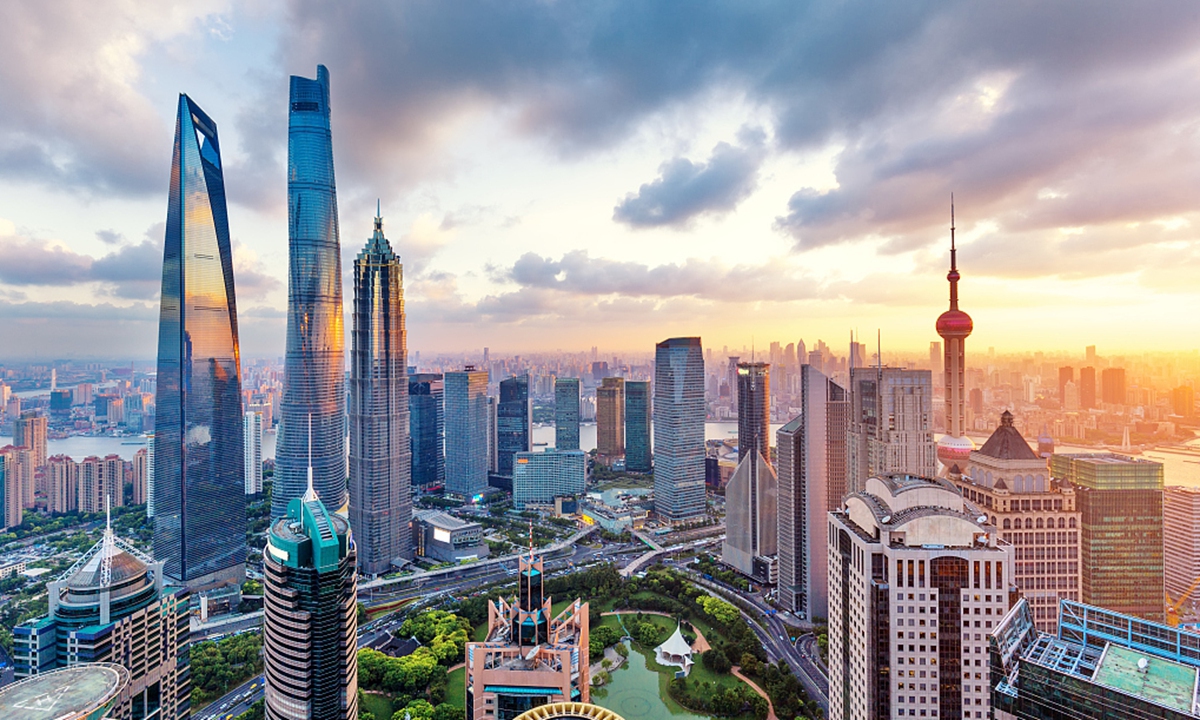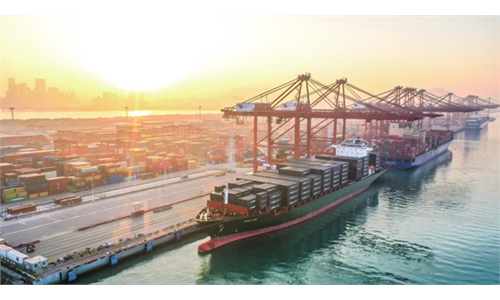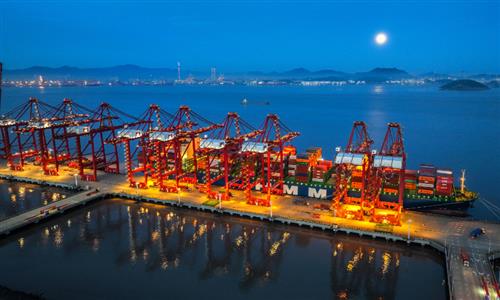GT Voice: Western cynicism, exaggeration over the Chinese economy just more background noise

Lujiazui Photo:VCG
Not many people in China - from top policymakers to people on the street - would deny the fact that the Chinese economy is facing difficulties. As early as in March 2022, in the Government Work Report released during the country's two sessions, Chinese officials recognized what they called "triple pressures" on the Chinese economy: shrinking demand, disrupted supply and weakening sentiment. Indeed, such an assessment has been guiding China's economic policymaking since the report's release. A range of supporting measures have recently been announced to address those exact challenges.And yet, there has been what appears to be a concerted campaign by Western officials and media outlets, especially those from the US, to revive the well-worn "China collapse" theory. "A crisis of confidence is gripping China's economy," an article in the New York Times (NYT) asserted. "Why is China in so much trouble?" another article in the NYT, written by famed US economist Paul Krugman, wondered. In fact, the NYT, since early August, has published at least a dozen articles seeking to portray a Chinese economy that is "on the brink of collapse." The NYT went even further, as one article, written by another famed NYT columnist Bret Stephens, sought to address how the US 'manage China's decline?"
The NYT is hardly alone in pushing such dire narratives about China's economy. By this point, the Chinese people are used to what they call "Western badmouthing of the Chinese economy," which has been a main theme in Western media over the past several decades - a period when China saw nothing less than a miracle in terms of economic development. Another theme is that China is growing so fast that it is perceived to have posed threat to the US economic dominance - the "China threat" theory. For anyone who follows Western media coverage of the Chinese economy, there is no middle ground between the two extremes. In fact, even as US officials and media outlets push the narrative of "China collapsing," the US government, citing "threats" to its "national security," is expanding restrictions and launching a crackdown on China to suppress its economic and technological advances.
The Chinese economy has had to deal with these dire predictions and a tsunami of misinformation - even disinformation -about its resilience from Western politicians and pundits over the years, but has actually thrived despite of these questions. However, such a vicious mentality of taking pleasure in other's misfortune has real and negative impact on the global economy's slow recovery from the COVID-19 pandemic. Amid a global economic downturn and an overall worsening geo-economic landscape, the world needs stable expectations and confidence more than ever. As a widely used Chinese phrase says, "confidence is gold." When consumers are confident about the future, they are more comfortable about spending, which in turn is good for economic development. When investors are confident, they would increase investment and hire more people, which is also great for economic development. The Western media's biased, cynical and toxic views of the Chinese economy - or the global economy as a whole for that matter - is bad for boosting confidence based on objective analysis of the status of the Chinese economy.
Yes, the Chinese economy is slowing down. Yes, the Chinese economy is facing great challenges and risks. But in the past four years, the Chinese economy is still one of the fastest-growing among all major economies. Despite bolder and stricter measures against COVID-19, the Chinese economy grew from 91.9 trillion yuan ($12.6 trillion) in 2018 to 121 trillion yuan in 2022, much faster than the US' growth during the same period and that of the eurozone. In its latest global economic outlook released in July, the IMF expects China to grow by 5.2 percent this year, compared to a 1.6 percent growth in the US and a 0.8 percent growth in the eurozone, and China is projected to contribute 34.9 percent to global economic growth in 2023.
How can anyone with reasonable mind claim that the Chinese economy is "on the cusp of collapsing?" The problem with the global economy is the lack of rational thinking. Officials and media outlets in the US and some of its allies are increasingly pushing their short-sighted, cynical and dangerous narratives of a world falling apart because of China's rise or fall - depending on what suits them at the time. Worse yet, what they call "fall" is motivated by political interest in the US, where competing for sound policies good for the US has given way to toxic competition of "toughness" on China. Many mainstream US media such as the NYT, when making dire predictions about the Chinese economy, appears to be offering cover for the current US administration which is struggling to address considerable risks and challenges facing the US economy, including persistent and rising inflation, lingering recessionary pressure, mounting debts and poor governance that can hardly produce any consistent and cohesive long-term economic development plans.
Using the troubles faced by others to justify indifference and inaction to one's own predicament is an embodiment of acting in bad faith. Actively trashing China to cover up one's own failures in addressing challenges is just vicious and dangerous, especially when it involves the world's biggest economy. China has considerable risks and challenges to address - the triple pressures - and it could take time, but it is still one of the biggest markets with the biggest growth potential. If there is any doubt, just ask all the multinational executives, including those from the US. China is also moving swiftly to address those challenges with a series of recent measures, which could help accelerate the recovery process of the Chinese economy from the COVID-19 pandemic. The most important thing for China is to carry out those policies effectively. China's economic governance over the past several decades and its vast potential should offer sufficient boost for confidence of those who objectively view the Chinese economy. As for all the cynicism in the Western media, they will in the end prove once again to be nothing but more background noise in China's long-term, steady economic development.



